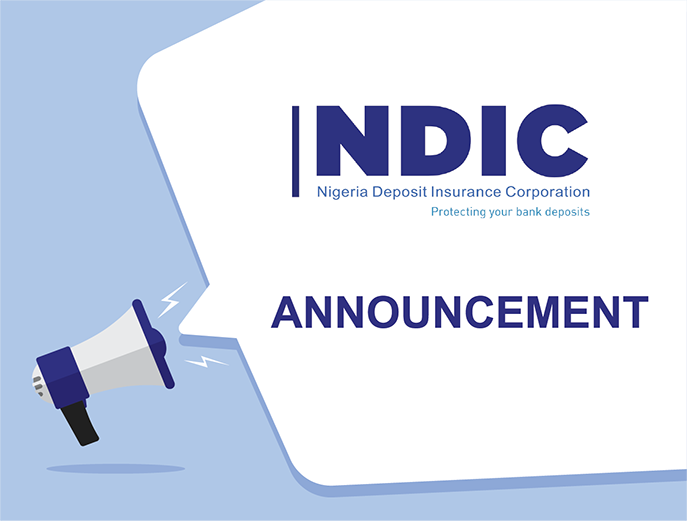The Nigeria Deposit Insurance Corporation (NDIC) held its 2020 International Conference with the theme: ‘Financial System Stability, Fintech & Emerging Risks: Challenges for Bank Supervisors’ between 22nd and 23rd, October 2020. The Conference which was the first to be organised by a Deposit Insurance System in Africa, was designed to promote knowledge and experience sharing amongst key stakeholders on Fintech, as well as provides opportunity to promote broad discussion on policy options to address emerging risks and opportunities associated with Fintech.
The 2-Day Conference had over 540 participants drawn from the International Association of Deposit Insurers (IADI), World Bank, International Monetary Fund (IMF), Deposit Insurance Organisations, Bank Supervisory & Resolution Authorities, as well as professionals & practitioners in the financial systems across the globe. Other participants included representatives of the Central Bank of Nigeria (CBN), FITC, Chartered Institute of Bankers of Nigeria (CIBN), ICPC, Economic and Financial Crimes Commission (EFCC), Nigerian Financial Intelligence Unit (NFIU) and Nigerian Universities.
Ten (10) papers were presented during the 2-days virtual conference. Pertinent issues were raised regarding financial system stability, the opportunities provided by the emergence of FINTECH as well as their possible risk to the financial systems. The papers were presented by the Central Bank of Nigeria (CBN); Ernst & Young, India; Central Deposit Insurance Corporation (CDIC), Taiwan; and Bank of International Settlements (BIS), Switzerland and the NDIC.
In his welcome address, the Managing Director/CE of the NDIC, Umaru Ibrahim, noted the role of disruptive financial technology in traditional financing structure, through chip-based debit/credit cards, mobile/web-based payments, cloud computing, as well as the immense opportunities and challenges it portends for financial stability and supervision/ regulatory paradigm. On her part, the NDIC Board Chairman, Mrs. Ronke Sokefun, broadly highlighted the many aspects that Fintech impacts the financial system. She also stressed the need for stakeholders to come together to share knowledge and experiences on challenges that Fintech poses to bank Supervisors and Regulators. The IADI Secretary General, Mr. David Walker, in his brief remarks at the opening ceremony, opined that, Fintech has ushered in a great transformation for the world of finance, with the pace quickened by the emergence of Covid-19 through increased digitalisation of most banking operations.
Learning PointsFintech and Suptech innovations for Early Warning Systems (EWS) are premised on revamping banking supervision to be more pro-active, forward-looking and relies on improved data collection and sophisticated data analytics based on Artificial Intelligence (AI), cloud computing and other related technologies for more effective data collection, monitoring, detecting red flags (possibly in real-time) and sophisticated risk analytics and forecasts.
The financial system is becoming increasingly sophisticated in terms of products and delivery mechanisms. Fintech and Suptech for bank supervision require internal reorganization in regulatory institutions with teams focused on core activities and technological skills (eg AI). Traditional skills like economics & finance together with know-how in AI, data science and analytics are also required.
Techniques like AI and other innovations must be understood and used by regulators/supervisors for their operations. Capacity-building in these complex fields is therefore necessary and specialists with understanding these modern fields and how they are applicable in banking and finance are needed.
Regulators should continue to strengthen the financial sector by leveraging on emerging technologies, like AI tools, to safeguard the stability of the financial system.
All financial institutions, regulators and policy makers should examine whether and how they can responsibly leverage AI and Machine Learning (ML) in ways that will benefit what they do and the society at large.
BigTechs are leaving no stones unturned in the financial services space. Building on their eCommerce platforms, some BigTechs have ventured into lending, mainly to SMEs and consumers, after their foray in payments.
Asian banks are moving towards open banking readiness. Nigerian and African banks should also emulate this emerging trend. The regulators should provide a guide and lead in this regard. For instance, in India, Account Aggregator ecosystem is established by the central bank as a data sharing framework for seamless sharing of financial data.
Asian banks are increasingly collaborating rather than competing with FinTech players to disrupt the financial services space. That includes the licensing of digital- or internet-only banks in the region. Nigerian and African authorities should fully understand all the business models of internet-only banks and then devise appropriate supervisory frameworks for them.
Regulators should ensure that the Fintech innovations are encouraged and appropriately regulated, while the existing regulations are strengthened to address influx of innovative Fintech products into traditional banking operations.
Regulatory institutions within a jurisdiction should also collaborate to identify potential threats, establish responses and ensure that emerging threats are known, shared and acted upon.
Regulators should also seek advice from technology experts and experts on consumer and data protection.
Cybersecurity is a complex and multifaceted challenge that is growing in importance. It is an issue that not only affects the banks and government agencies that are frequently highlighted through the press but its implications continue to expand beyond that. Regulators and regulated entities should understand all cybersecurity concerns, collaborate with all relevant parties and improve public awareness of this risk to all concerned.
Nigeria Deposit Insurance Corporation (NDIC)
November, 2020.



